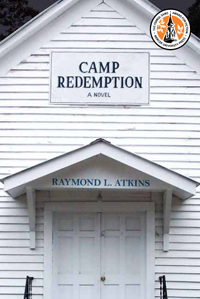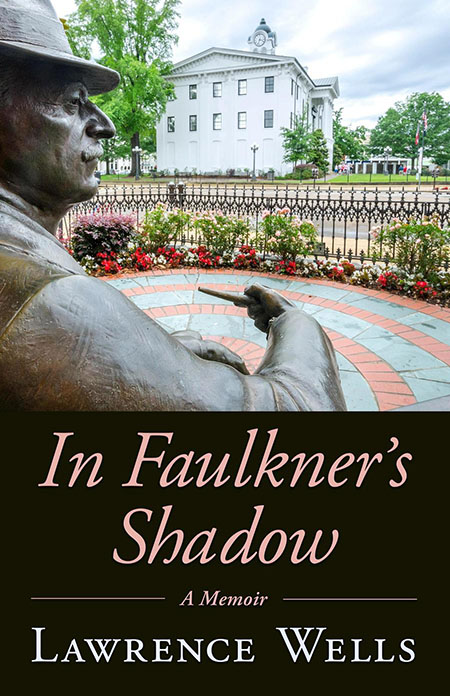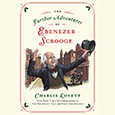Valley of Second Chances
A spirit-filled campground is the setting for Raymond L. Atkins’s comic novel
Winner of the 2011 Ferrol Sams Award for Fiction, Camp Redemption by Georgia author Raymond L. Atkins tells the story of Early Willingham, a mild-mannered mechanic with a fondness for Schlitz malt liquor, and his strong-willed, Scripture-quoting, clairvoyant sister, Ivey. They are the last of a long line of Willinghams and the proprietors of a children’s Bible camp near Sequoyah, Georgia, at the southern tip of the Appalachians. The land on which the camp is built has been in their family for more than two hundred years—ever since their ancestor, Seaborn Willingham, took a mattock to the previous owner, a Chickasaw named Robert Corntassel.
 Encompassing more than 400 acres, the Willingham Valley, as it subsequently came to be known, includes a lake and a river (complete with waterfall), Native-American burial mounds, prehistoric cave paintings, a Willingham family cemetery, various camp buildings, and a small marijuana patch (purely for Early’s own recreational use). The name of the camp comes from a Civil-War-era encampment established on the grounds by Seaborn’s son, Munroe, “the first of several Willingham men to eventually get himself shot for no particularly good reason.” When Munroe was deemed unfit for service in the Confederate Army “due to a combination of hunched back, weak chest, bad eyes, crooked fingers, and clubbed foot,” he established his own training camp, “Camp Redemption,” which attracted those who were similarly afflicted. These “Georgia Irregulars” engaged in their first and final battle in May of 1864, when they were routed by the Union Army thirty miles outside of Willingham Valley. Sustaining a fatality rate of one hundred percent (to the enemy’s zero), the Georgia Irregulars passed into the history books without ever knowing that “they might just have well have stayed on the porch, sipped good corn whiskey, and talked about the weather or the price of hogs.”
Encompassing more than 400 acres, the Willingham Valley, as it subsequently came to be known, includes a lake and a river (complete with waterfall), Native-American burial mounds, prehistoric cave paintings, a Willingham family cemetery, various camp buildings, and a small marijuana patch (purely for Early’s own recreational use). The name of the camp comes from a Civil-War-era encampment established on the grounds by Seaborn’s son, Munroe, “the first of several Willingham men to eventually get himself shot for no particularly good reason.” When Munroe was deemed unfit for service in the Confederate Army “due to a combination of hunched back, weak chest, bad eyes, crooked fingers, and clubbed foot,” he established his own training camp, “Camp Redemption,” which attracted those who were similarly afflicted. These “Georgia Irregulars” engaged in their first and final battle in May of 1864, when they were routed by the Union Army thirty miles outside of Willingham Valley. Sustaining a fatality rate of one hundred percent (to the enemy’s zero), the Georgia Irregulars passed into the history books without ever knowing that “they might just have well have stayed on the porch, sipped good corn whiskey, and talked about the weather or the price of hogs.”
Despite this ignominious beginning, Camp Redemption is reborn in 1976 thanks to a revelation Ivey receives from her late mother. “Mama’s fine and she says hello,” Ivey explains later to Early. “Jesus sent her back down here to tell us to start a ministry here in the valley. A Bible camp for young people.” Early is used to the spiritual direction his sister receives from beyond and finds her prophecies to be on the money more often than not. Because of this proven track record, plus his genuine fondness for her, Early decides to humor his sister, and a successful family business is begun.
 The novel’s main story begins thirty years later: it’s 2010, the economy has tanked, and camp attendance is way down. “How did parents these days think they were going to get their youngsters into heaven if they didn’t send them for religious instruction?” Early wonders. “Salvation needed precise planning and flawless execution. It needed cabins, bunks, and Camp Redemption t-shirts to help it along.” The Willinghams are forced to close for the summer, and that’s when Ivey receives a new revelation: this time, it’s from Robert Corntassel himself. “He told me that it was our task to help the needy,” Ivey explains, “and that Jesus would tell us when to begin, and who to begin with.”
The novel’s main story begins thirty years later: it’s 2010, the economy has tanked, and camp attendance is way down. “How did parents these days think they were going to get their youngsters into heaven if they didn’t send them for religious instruction?” Early wonders. “Salvation needed precise planning and flawless execution. It needed cabins, bunks, and Camp Redemption t-shirts to help it along.” The Willinghams are forced to close for the summer, and that’s when Ivey receives a new revelation: this time, it’s from Robert Corntassel himself. “He told me that it was our task to help the needy,” Ivey explains, “and that Jesus would tell us when to begin, and who to begin with.”
Early is skeptical at first. He is also preoccupied with the fear that to make ends meet they may be forced to sell off some of their land to local developer Gilla Newman, a man who would “climb a tree to screw you rather than stand flat-footed on the ground and give you a fair shake.” That’s when fifteen-year-old Jesús Jimenez shows up. A runaway from Apalachicola, Florida, Jesús is fleeing an abusive father and takes refuge at the camp. Ivey is thrilled with this almost literal answer to her prayers, and Early, although wary of breaking the law by harboring a teenage runaway, gradually begins to feel a sympathetic affection for the boy and decides to let him stay. It’s the beginning of a stream of down-on-their-luck misfits who take refuge at Camp Redemption, looking for a little rest, a place to lie low, or maybe even a brand-new start.
It won’t be easy for the inhabitants to escape the past, and the spirits predict betrayal and death in the offing, but Ivey is convinced that the Willingham family can fulfill their new mission and do some good in the world. Filled with colorful characters and quaint locales (Ivey attends church at the Washed in the Blood and the Fire Rapture Preparation Temple, while Early meets his lawyer at the Jesus is Going Out of Business Diner), Camp Redemption is a gentle comic meditation on the surprising things that can happen when we reach out a hand to those in need.
The Chickasaw believed the waterfall in Willingham Valley to have magical properties, and Early’s father taught him that little people inhabit the lake. In the light of day, Atkins writes, Early has trouble believing in “the trappings of a mystic reality, a fragile, delicate land where all things were possible. But in the evenings, by the waters in the enchanted moments just before the sun stretched and went to its nightly sleep, Early could take a puff from the Dr. Grabow and a swallow from the can of Schlitz malt liquor, and then he could see it all.”
Raymond L. Atkins will discuss the novel at Burke’s Book Store in Memphis on June 6, 2013, at 5:30 p.m.


